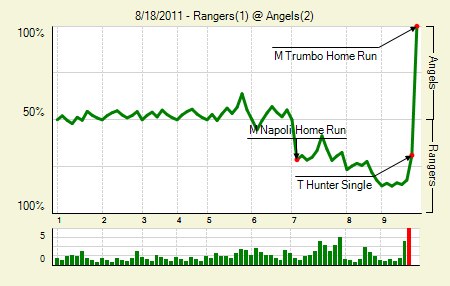NOTE: If you haven’t seen the poll, then click that FIRST, then come back here to read more.
***
I asked this question in a poll:
Player X created 105 runs in 105 games. AFTER which player would you slot him in, wrt MVP?
And I gave a list of Player A (150 runs) to Player F (100 runs). But in all cases, those guys played 162 games.
A straight arrow reader deduced the true intent of the question:
So the question is how you handle 57 games of production from somebody else.
a. Do you ignore it completely and just judge the guy on his 105?
b. Do you assume replacement level production?
c. Average?
If you simply give this player zero credit for the missing 57 games, then you would slot this player who created 105 runs in 105 games in between Player E (110 runs in 162 games) and Player F (100 runs in 162 games).
But perhaps you want to go the other way, and figure that the missing 57 games will be picked up by an average player, and so, you credit Player X with those runs (28.5 runs in this case), and so his 105 runs in 105 games is EQUIVALENT to created 133.5 runs in 162 games. Therefore, you’d slot him between Player B (140 runs in 162 games) and Player C (130 runs in 162 games).
Perhaps you think both those options are unfair:
(i) it’s unfair to presume an average player would pick up the slack
(ii) it’s unfair to presume that those 57 games would be a complete black hole
So, perhaps you decide that those 57 games need to get some runs credited to our Player X. Since the average player would create 28.5 runs, and a black hole player (i.e., pitcher as batter basically) would create 0 runs, then maybe something in-between, say 14 runs is what you should count.
Our Player X, with 105 runs in 105 games would be equivalent to a player with 119 runs in 162 games. And so, you would slot that player between Player D (120 runs in 162 games) and Player E (110 runs in 162 games).
The consensus pick was between Player C (130 runs in 162 games) and Player D (120 runs in 162 games). Therefore, Player X (105 runs in 105 games) would be equivalent to a player with 125 runs in 162 games.
Mathematically, you’d write this as:
105 – 105x = 125 – 162x
Rearranging the terms:
20 = 57 x
Solving for x gives us x = 0.35
Therefore, we give our Player X a rate of 0.35 runs per missing game.
Since the average rate (as noted in the poll) was 81 runs in 162 games, or 0.50 runs per game, then our “replacement level” is 0.35 runs per game, or -0.15 runs relative to average.
And -0.15 runs per game times 162 games is 24 runs per season. That’s where you readers have established the replacement level. And, as luck would have it, that’s pretty much exactly where saberists like to set the replacement level.
How you chose your answer is exactly how you handle replacement level for MVP discussions. For those who slotted him between the 110 and 100 runs created player, then you don’t believe that you should use replacement level for MVP discussions.


